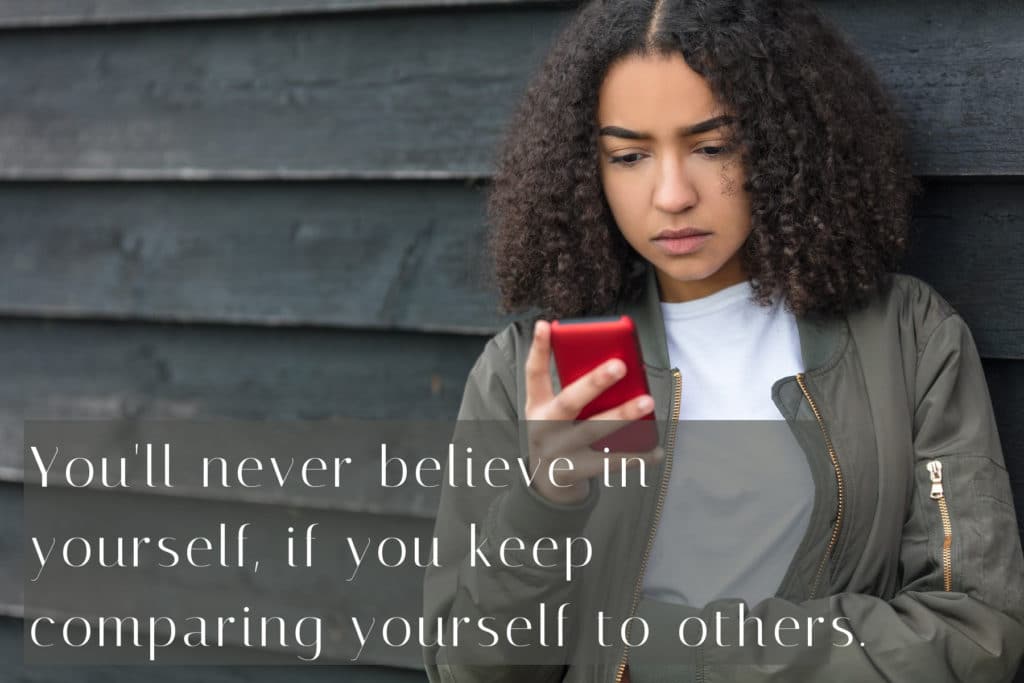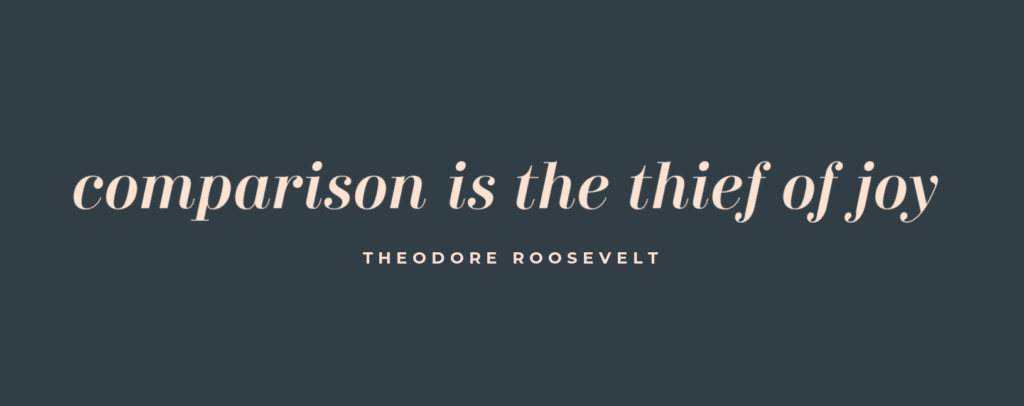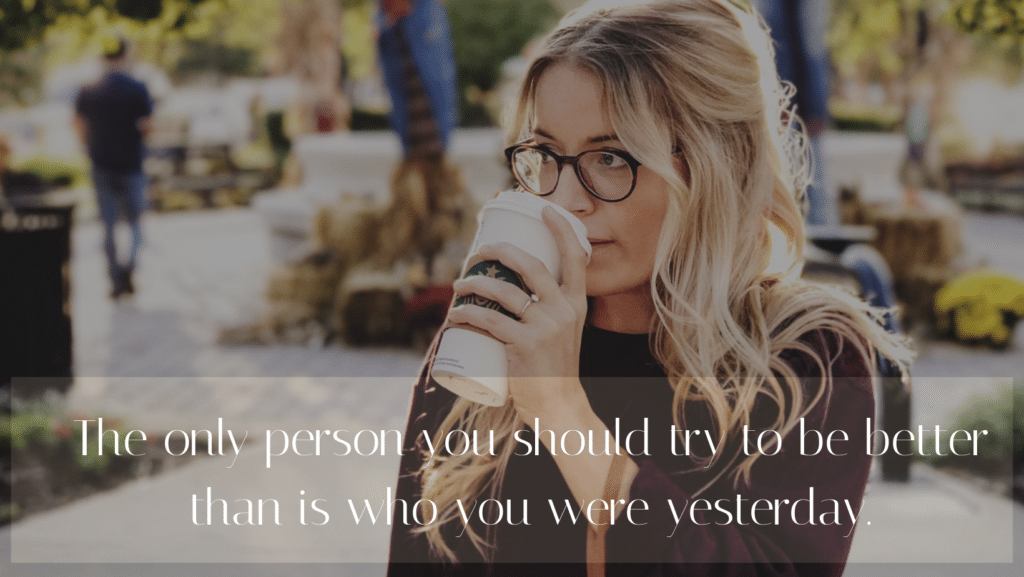I Don’t Have To Be Better; I Just Have To Be Me – Santa Maria College

In our teenage years, it is grades and results, clothes and sneakers. In adulthood, it is jobs, houses, cars and holidays. Why are we, as humans, so obsessed with comparing ourselves to others?
When I started doing Pilates, I was concerned that I was not as flexible or as strong as others. But I soon realised that everyone was so focussed on themselves that they did not care or even notice what I was doing or not doing.
All of us have compared ourselves to someone else at some point in our lives. It might have been a classmate, friend, co-worker, neighbour, or even a celebrity. Competition and comparison to others are common, not just in schools but in society, where there is a heavy emphasis on performance, perfection and achievement. This may also be the case in some families.
It is human instinct to compare ourselves to others. We might have wished we had their looks, money, or number of social media followers. We compare our partners, our cars, and even our meals when we order at a restaurant! And have meal envy when someone else gets a better choice. We have become a visual culture where what we see is overwhelmingly important. The tendency to compare ourselves is a very common human reaction.
So why this obsession and worry about what others think?
Social comparison is a form of sociological self-esteem, where we derive our sense of self through comparing ourselves with others (Festinger, 1954).
When we compare ourselves to others, we get information about what we want and where we want to be, and we get feedback on how we measure up.
Young people’s sense of identity is very important; they want to be like others. Every day, they are bombarded with digitally altered images of people with perfect bodies who are living the ‘perfect life’. Young people today have so many choices and often unlimited freedom and money to purchase the perfect clothes, accessories and technology.
While we are all guilty of comparison, teenagers are particularly vulnerable to its damaging effects.

Why is comparing ourselves to others a problem?
Teens tend to focus on qualities such as perceived attractiveness and popularity when they engage in social comparison and particularly feel the effects of comparison when it comes to body image. Many young people follow celebrities, influencers and friends, following and liking their stories and photos. Such content creates pressure and expectations around their own appearance and weight and an obsession with selfies and posting photos. This leads to ‘likes’ and affirmation of their appearance. We acknowledge how difficult it is to avoid comparisons around body image but still seek out these visual displays that impact our perception of body image as young people and adults.
Young people may compare their abilities and skills, such as academic results, sports ability or artistic talent. The comparisons lead to the feeling of inadequacy and a lack of confidence in their ability, which impacts their willingness to be brave and have a go. This can be so damaging to self-esteem.
Constant comparisons and the resulting evaluation of self versus others can create a judgmental, competitive outlook. This is detrimental to the wellbeing of people who make frequent social comparisons. They are more likely to experience envy, guilt, regret, and defensiveness and be resentful of others. These feelings can interfere with the happiness and joy they can experience in life. In more serious situations, this can lead to depression and anxiety.
10 tips to limit the impact of comparisons
- Choose what you follow online as selectively as you choose your friends. Follow those who are inspiring, not those showcasing their ‘perfect life’.
- Encourage a critical approach to viewing and creating social media content, challenging the truthfulness of images, and considering the motives behind celebrity and peer posts.
- Avoid triggers such as looking at social media when feeling vulnerable when comparisons are more difficult to manage.
- Remember to be grateful for what you have, which helps keep negative comparisons at bay.
- Use comparison as inspiration. Let others’ achievements serve as examples of where you want to go and take steps to make it happen. Celebrate the process of learning, of the journey, not the finished product or the result.
- Focus on your strengths. We’re all good at something. Determine what this is and develop further in this area. Talk to your teens about what they like about themselves and how to show self-compassion
- Accept your imperfections. Nobody’s perfect. No matter how rich or famous, everyone has insecurities and flaws. Support your children unconditionally, encouraging them to embrace who they are, just as they are? Promote persistence, not perfection.
- Embrace diversity and appreciate others. Appreciating others helps us turn self-judgment into an authentic appreciation of their achievement. This act of kindness shifts our mood toward a more positive state.
- Unplug from social media. Both as adults and young people, we need to connect more with our natural world.
- As parents, we can refrain from putting images of young children online and minimise their exposure to digital media until they understand the influence of social media. Once they have social media, there must be rules and boundaries around social media use.

Rarely do we make a comparison without feeling jealous, inferior, or inadequate. Unfortunately, our culture encourages comparisons, idolising people who seem to have it all. Teens are especially susceptible to falling into a habit of comparing themselves because they are trying to establish their own identity.
As adults, we need to be role models taking the focus off others to a focus on self and instilling in our young people that ‘I don’t have to better; I just have to be me.’

Combating The Attention Spans Crisis In Our Students – Jennifer Oaten
It is no secret that attention spans have been steadily declining, especially among younger generations growing up immersed in digital technology. The average person’s attention span when using a digital device has plummeted from around two and a half minutes back in 2004 to just 47 seconds on average today – a dramatic 66% decrease over the past two decades.

Weekly Wrap Up: Term 2, Week 2, 2024
Week 2 has come to an end! This Weekly Wrap Up features highlights from Scuba Diving Club, the Sisterhood Series, and Boarding ANZAC Service.

Santa Maria Teams Shine in Term 1 Sports
Santa Maria had a huge number of girls in the IGSSA AFL and Volleyball competition with strong results for a number of teams.
Author: Santa Maria College
Santa Maria College is a vibrant girls school with a growing local presence and reputation. Our Mission is to educate young Mercy women who act with courage and compassion to enrich our world. Santa Maria College is located in Attadale in Western Australia, 16 km from the Perth CBD. We offer a Catholic education for girls in Years 5 – 12 and have 1300 students, including 152 boarders.






